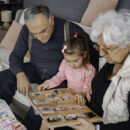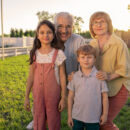Coping with Grief and Loss in Senior Communities

Grief and loss are difficult experiences that deeply affect older adults, especially those in senior communities. These individuals often face the death of a loved spouse, close friends, or their independence, which can lead to intense feelings of sadness, anger, and loneliness. In senior communities, understanding and addressing grief is essential. Recognizing the unique challenges older adults face helps create a supportive environment where they can navigate their emotions.
Providing compassionate care and resources tailored to the elderly can make a significant difference in their healing process. By focusing on the emotional and practical needs of grieving seniors, we can help them find comfort and support during these tough times. In this article from Koelsch Communities, we’ll take a closer look at how to best serve our loved ones when they experience grief. Let’s get started.
The Five Stages of Grief
We’ll begin by looking at the five stages of grief. These stages are not unique to seniors; all ages of people experience these stages after a significant loss. The five stages of grief offer a framework to understand the emotions and reactions many people experience after a loss. These stages are not linear, and individuals may move between them in different ways.
Denial
In the denial stage, people struggle to accept the reality of the loss. They may feel numb or in shock, unable to believe what has happened. This initial reaction helps to buffer the immediate impact of the event, providing a temporary escape from the intense pain.
Anger
Anger often follows denial and can manifest in various forms, such as frustration, irritation, or even rage. Individuals might question the fairness of the loss, directing their anger towards themselves, others, or a higher power. This stage is a natural part of the healing process, allowing the expression of pent-up emotions.
Bargaining
During bargaining, individuals often dwell on “what if” or “if only” statements, hoping to reverse or lessen the impact of the loss. They may try to negotiate with themselves or a higher power, seeking to regain a sense of control in an uncontrollable situation.
Depression
Depression sets in when the reality of the loss becomes unavoidable. Feelings of deep sadness, hopelessness, and withdrawal are common. This stage involves mourning the person who has died and reflecting on the impact of the loss. It’s a time of processing and coming to terms with what has happened.
Acceptance
Acceptance doesn’t mean being okay with the loss. Instead, it involves coming to terms with the new reality. Individuals begin to adjust to life without their loved one, finding ways to move forward while still cherishing memories. Acceptance is about acknowledging the loss and learning to live with it.
How to Cope With Grief
Coping with grief involves finding ways to manage the intense emotions that come with loss. It is a deeply personal process, and different strategies work for different people. Here are some effective approaches to help navigate through grief:
Seeking Professional Help
Talking to a therapist can help you understand and process your feelings. Therapists provide personalized strategies to manage your grief, offering tools and techniques to help you navigate this difficult time. Regular sessions can provide a safe space to express your feelings.
Joining Support Groups
Support groups offer a space to share your experiences with others who understand what you’re going through. This sense of community can provide comfort and reassurance. Being with people who have similar experiences can help you feel less alone and more supported.
Engaging in Physical Activities
Regular exercise can improve your mood and overall well-being. Activities like walking, gardening, yoga, or swimming can help reduce stress and provide a healthy distraction. Physical activity releases endorphins, which can help lift your spirits and improve your mental health.
Maintaining Social Connections
Staying connected with family members and friends is crucial. They can offer support, listen to you, and help you feel less isolated during difficult times. Regular social interaction can provide emotional support and remind you that you are not alone.
Spiritual and Religious Practices
Engaging in spiritual or religious activities can provide comfort and a sense of peace. Practices like prayer, meditation, or attending services can help you find meaning and support. These practices can offer solace and a way to connect with a higher power or community.
Grief in seniors often involves multiple losses at once, which can make it particularly challenging. Recognizing these compounded losses helps in providing the right support. Understanding the unique nature of grief in the elderly is crucial for fostering a compassionate community.
The Unique Nature of Grief in Elderly Populations
Emotional and Physical Aspects of Grief
Grief affects seniors differently than younger people. Emotionally, they may feel deep sadness, anger, or guilt. These feelings often come in waves and can be intense and feel overwhelming, making it hard for seniors to focus or find joy in activities they once loved. Physically, grief can cause fatigue, changes in appetite, and sleep problems. Seniors might experience headaches, chest pain, or other aches and pains, which can be as challenging as the emotional symptoms. These physical effects can make daily activities and self-care more difficult for seniors, requiring extra support and understanding from those around them.
Common Triggers of Grief for Older Adults
Several events can trigger different types of grief in older adults. The death of a spouse is a major trigger, causing profound loneliness and a sense of loss. Losing close friends or siblings can also deeply affect them, as these relationships often span many decades. Significant life changes, like moving to a senior community, can bring feelings of anticipatory grief due to the loss of a familiar environment. Even the loss of independence due to health issues or the inability to drive can be significant triggers. Recognizing these triggers helps in providing better support to grieving seniors.
Common Reactions to Loss and Grief in the Elderly
Emotional Responses
Older adults often experience intense emotional reactions when a spouse passes. Sadness and loneliness are common, but anger and guilt can also surface. These emotions can fluctuate, making it hard to predict how one might feel from day to day. Feelings of helplessness and despair may also emerge, especially if the loss was sudden or unexpected.
Physical Symptoms
Grief can affect the body as well as the mind. Many seniors experience fatigue, headaches, and changes in appetite. Sleep problems are also common, ranging from insomnia to sleeping too much. Some might notice aches and pains or feel a general sense of physical discomfort. These physical symptoms can make daily activities more challenging and may require medical attention if they persist.
Behavioral Changes
Behavioral changes often accompany grief. Some older adults may withdraw from social activities they once enjoyed, avoiding friends and family. Others might experience restlessness or find it hard to focus on tasks. Changes in routine, like neglecting personal hygiene or household chores, can also occur. These changes can be temporary, but they may signal the need for additional support or intervention if they persist.
The Three Cs of Grieving: Compassion, Communication, and Connection
Compassion: Self-Care and Patience
Compassion begins with self-care and patience. Grieving takes a toll on both the mind and body, so it’s important to take time for yourself. Ensure you get enough rest, eat nutritious meals, and engage in activities that bring you peace. Understand that everyone grieves differently, and it’s okay to take as long as you need to heal.
Communication: Expressing Feelings
Communication is key to processing grief. Talking about your feelings with trusted friends, family, or a counselor can provide relief and understanding. Sharing your emotions can help ease the burden of grief. Writing in a journal can also be therapeutic, allowing you to express your thoughts and feelings in a private, reflective way.
Connection: Building and Maintaining Relationships
Maintaining social connections during times of grief is crucial. Reach out to friends and family members, and don’t hesitate to lean on them for support. Participate in community activities or join support groups where you can meet others who understand what you’re experiencing. These relationships offer emotional support and remind you that you’re not alone.
To help older adults through the grieving process, create environments where compassion, communication, and connection thrive. This support helps them navigate their grief with the care and understanding they deserve.
Benefits of Therapy for Grieving Seniors
Types of Therapy Available
Seniors dealing with grief have several therapy options. Individual counseling provides one-on-one support, allowing seniors to explore their feelings in a private setting. Group therapy offers a chance to connect with others experiencing similar losses, fostering a sense of community and shared understanding. Specialized grief counseling focuses specifically on the grieving process, helping seniors navigate their emotions and find coping strategies.
How to Find the Right Therapist
Finding the right therapist can make a significant difference in managing grief. Start by seeking recommendations from trusted sources like family members or health care providers. Look for therapists who specialize in grief and have experience working with older adults. Check their credentials and read reviews to gauge their effectiveness. Scheduling a consultation can also help determine if the therapist’s approach aligns with your needs.
Things to Do After the Death of a Spouse
Handling Legal and Financial Matters
Notify financial institutions, close accounts, and handle any legal paperwork. Obtain several copies of the death certificate for various legal needs. Contact the life insurance company to file a claim. Notify the Social Security Administration and any other relevant agencies. Review and update your financial and estate plans, including any changes needed for credit cards and bank accounts.
Informing Family and Friends
Communicate the news to family members and friends. It’s important to share the information promptly and clearly. Lean on close family and friends for support during this difficult time. Consider creating a phone tree or group chat to keep everyone informed without having to repeat the news multiple times.
Planning Memorial Services
Organize a memorial service that honors your spouse’s life. This can be a time for family and friends to come together, share memories, and support each other. Decide on the type of service, whether it’s a traditional funeral, a celebration of life, or another format. Coordinate with a funeral home or community center, and make arrangements for any specific wishes your spouse may have had.
Creating a Supportive Community Environment for Grieving Seniors
Role of Family Members
Family members play a vital role in supporting grieving seniors. Regular visits, phone calls, and video chats can help maintain emotional bonds. Listen actively to their feelings, offer reassurance, and encourage them to share memories. Simple acts of kindness and spending time together can make a significant difference.
Role of Community Staff and Caregivers
Community staff and caregivers are essential in providing daily support to grieving seniors. They should receive training on recognizing signs of grief and offering appropriate support. Creating a compassionate and empathetic environment helps residents feel safe and understood. Staff can organize activities that promote social interaction and emotional well-being.
Importance of Peer Support
Peer support is invaluable for seniors dealing with grief. Encouraging residents to join support groups or participate in community events helps build connections with others who share similar experiences. Peer support fosters a sense of belonging and reduces feelings of isolation, making it easier for seniors to cope with their grief.
Activities and Hobbies to Help Seniors Cope With Grief
Creative Outlets: Art and Music Therapy
Engaging in art and music therapy offers a powerful way to express emotions. Painting, drawing, or playing an instrument can help process feelings that might be hard to put into words. These creative activities provide a sense of accomplishment and a break from grief.
Volunteering and Giving Back
Helping others can be deeply rewarding. Volunteering at local charities or community centers not only benefits those in need but also fosters a sense of purpose and connection. It shifts focus from personal grief to the broader needs of the community, creating a positive impact.
Participating in Group Activities
Group activities, such as book clubs, exercise classes, or social gatherings, provide opportunities to meet new people and stay engaged. These interactions can reduce feelings of isolation and build a support network. Participating in regular group activities helps create structure and routine, which are important during difficult times.
Closing Thoughts
Coping with grief in senior communities means understanding how grief affects older adults, recognizing the stages of grief, and using effective strategies to cope. Seniors often face multiple losses, which can make their grief feel more intense. They experience a range of emotions, physical symptoms, and changes in behavior that need compassionate support.
Seeking support is crucial. Therapy and counseling provide safe spaces to share your feelings. Support groups connect you with others who are going through similar experiences. Engaging in activities you enjoy and staying connected with friends and family can offer comfort and help reduce feelings of loneliness.
Staying connected with loved ones and community members is essential. Regular interactions and shared activities can make a big difference. By fostering these connections and seeking professional help when needed, seniors can navigate grief with more resilience and find a path toward healing.
About Koelsch Communities
Koelsch Communities offers a wide range of “Mom-approved” senior living options designed to create fulfilling and enjoyable experiences. With over 60 years of experience, we have built a reputation for providing top-quality care and exceptional living environments. Our communities are staffed by professionals dedicated to treating our Ladies and Gentlemen with respect and providing the special attention they need.
We pride ourselves on our high customer satisfaction, which reflects our commitment to excellence. Our experienced team ensures that every resident feels valued and cared for, promoting a thriving and supportive community atmosphere.
For more information about our senior living options and to discover how we can help you or your loved one enjoy the finest living experiences, please contact us today. We look forward to welcoming you to our community and helping you find the perfect senior living solution.
Disclaimer: This article is for informational purposes only and does not constitute medical, legal, or financial advice. It’s recommended to consult with a medical, legal, or financial professional for your specific circumstances.









